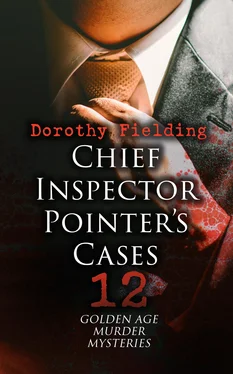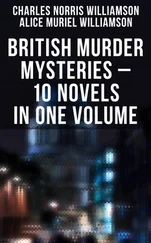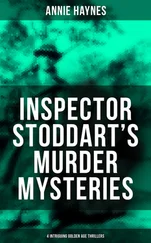"Did the Chief Inspector give you any further instructions?"
"Yes, sir. To follow the count afterwards. If he goes back to his flat I'm off for home, too. There's another chap watching his rooms all night."
"Good. I'll follow the lady."
It was not a long wait, an hour at most, before the two reappeared in the door. Rodman watched the Alfa Romeo glide away into the darkness. Then he attached himself again to the back of Sibella's car, and was driven home to Stillwater once more.
Close to the main gate he dropped behind. After some minutes he slipped through, stacked his bicycle behind a potting shed, and crept into the house.
Behind his arm-chair sat Harris.
"Gone up yet, sir?" whispered Rodman.
"Hasn't come in yet."
They waited a little longer. Then Rodman rose. "I'm going to the garage to see if anything's up."
Sibella's cubicle was empty. The inspector dared not switch on the light. She might be waiting outside on the drive. He crept forward foot by foot along its winding curves, the awful truth rising higher with every step.
Sibella had gone.
She must have nosed the car down the drive, lights out, and passed on into the road again through one of the two other gates.
He went indoors and asked Harris in a whisper to come out.
"Did you follow her all right?" asked the superintendent.
"All wrong!" groaned Rodman, and he told of his failure.
"Too bad," sympathised the kindly Harris. "Would have happened to any one. But not to Alf," he said privately. "Alf never gets left. Never did. Wherever do you think she's gone to?" he asked aloud.
Rodman wisely refused to start a list of the towns and villages of England.
"Well, when you feel like tackling an early worm, come around to my house. I'm off for bed, as there seems nothing doing here that one man can't handle."
And Rodman certainly did not, and could not, consider himself overworked for the remainder of the night.
It was nearly six in the morning when, like music to the tired ears of the detective, came the sound of the little two-seater again. The front gates opened once more. This time Sibella left her car in the garage, and walked rapidly towards the house. By the light of early day, Rodman had traced the marks of last night quite easily. They ran as he had expected.
At the police station he found the Chief Inspector in possession of the news. Pointer greeted him with at least outward calmness, though he looked very thoughtful. Poor Rodman could hardly swallow a morsel of food.
Half-way through the meal Briggs's voice sounded outside, all eagerness.
"The report's come in from the man who's watching the count's rooms, sir. This is a rum go, and no mistake!"
Pointer lingered to finish his cup of tea. It must serve him at a pinch instead of a night's sleep. Harris shook his head as he led the way into the station.
"A little more of what the chief calls ' tenew ' wouldn't harm you, Briggs. You might be an old maid receiving her first proposal. Why, you're all of a twitter. Now let's learn the damage."
Harris took the receiver, and listened with a slowly opening mouth.
"You don't—not Miss—not—well, I'm blowed!" And the upholder of tenew dropped into a chair, then looked at Rodman.
"Some one's drunk. Either you, or me, or that chap who's just reported. Didn't you follow Miss Scarlett all the way back from the restaurant here?"
"Certainly, sir."
"Well, the Yard 'tec says she left Count di Monti's rooms at exactly ten minutes past five this morning."
Pointer, who had come into the room, stared at Harris as though the truth lay graven on the superintendent's very spine, and stretched for the receiver. Then he dropped his hand.
"I'll go myself. But what's the good? There's no need to hurry—now!"
"You talking English?" Harris asked curiously.
"I'll translate." Pointer spoke rather dryly. "Inspector Rodman followed, not Miss Scarlett, but II Primo Capitano del Fascio Arditi, Conte Cangrande Giulio di Monti commanding the 41st Legion of the II. Cohort, from the restaurant to Stillwater last night.
"You said you noticed how much better she was driving, as though she had a weight off her mind," He turned to the breathless Rodman. "The two changed rigs in restaurant, and what with those cloaks, her veiling, his goggles, besides some sort of a lift inside her shoes, they fooled you, Rodman. But that's what happened. Doubtless they chose that restaurant because it's one of the few where cars can be parked practically at the door. She went to his rooms and stayed there till he should be safely aboard a ship, friend's yacht probably. He bought a duplicate outfit of the clothes she was wearing, and left it at his flat for her, as well as a woman's rigout for himself, which latter he sends in a box to the restaurant. She rests in peace and quiet in his rooms, and changes again. At the hour agreed on, five, she comes down to Stillwater by taxi. He leaves her two-seater at some place not far off, when he's picked up by a friend's motor. There you have their little plan. Simple, eh?"
"Well, I'm glad it ain't what I first thought!" Briggs said simply.
"So 'm I!" said Harris. "Though helping a murderer, to escape! In love with him. Must be! If so, this version sounds the sort of thing Miss Sib might do. She's all the 'go' of the Scarletts in her. But to connive at an escape!" Harris ruminated on. "She has gone and got herself into a nice fix! She can't have thought him guilty, that's sure!"
"On the contrary," Pointer almost laughed, "on the contrary! It shows that di Monti told her that he murdered Miss Charteris. Or Miss Scarlett would never have done what she did. If, by some mischance, say a fire, she had been found in his rooms! She wouldn't have run that risk unless she thought beyond a chance of a mistake both that he was guilty, and that he was in a very tight place. I rather felt that he was putting his back against the wall when I met him on the stairs of his rooms. Now what could have—I won't say frightened him, di Monti isn't a frightenable, man—but shown him that if he wanted to get away he must do so at once?"
And as though it were a play at a theatre, and those words his cue, a constable entered the room and supplied the answer.
He held out a pear-shaped, dark blue stone that glittered and sparkled as though rolled in gold dust. At the smaller end was a wreath of silver leaves with clusters of grapes in amethysts and garnets. A grape tendril served as a loop, and cut into the other end were three gold bails and the initials C.M. It was the Medici pendant.
"Where in the world did you get this from?" Superintendent Harris got out his notebook.
"From Fiery Jim, sir."
"Temper?" asked Pointer.
"Neither. He's a good sort, is poor Jim, but he can't resist a fire. Born that way. Chronic. He'd set fire to himself if there were no other way of turning out the fire brigade, and they don't like it. Neither do the farmers."
"Naturally?"
"Very naturally. So we see to it that he stays in workhouses when he's not in prison. Never for anything but incendiarism, I assure you. He's quite a favourite, when he's safe. There's no vice in Fiery Jim."
"And how does he explain this find?"
"The shepherd put me on to him, sir. He'd noticed' him playing with it. At first the old chap took it for granted it was a piece of glass, but when he looked closer he recognised it by the description, and brought Jim here."
"Have him in."
Fiery Jim was not good at consecutive narrative. But the superintendent was capital on this, his own ground, and unwound him as I neatly as a silk spinner would a cocoon, firmly but gently drawing from him what he wanted.
Jim's many half-tales, woven together, made this:
Last Thursday night he was walking along the short cut on an errand from the Master of Medchester workhouse with a boy as guardian, when they saw a tall, dark, well-dressed man come striding out from the copse. This was just as the church clock struck ten, for it was to count the strokes that the two had stopped and turned. Jim saw that the man was a stranger, and asked for a match. The stranger didn't understand. Jim held out his hand, repeating his request. The man seemed to mistake him for a beggar. He snarled out something about an echo, and flung a stone at him. Jim's black eye was an "exhibit" to this part of the story. The stranger tore on, and Jim groped for the stone, to carry it and his tale to the Master. But he liked the way it flashed, and sparkled, and kept it as a plaything, taking it out every now and then, and watching it. Fiery Jim had no idea of values.
Читать дальше












